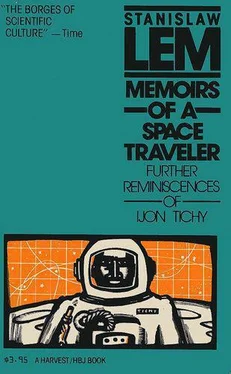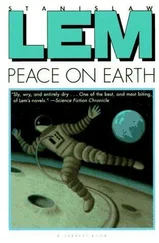For the Universe exists on credit. It represents, with its constellations and galaxies, a monstrous debt, a pawn ticket, as it were, a promissory note that must ultimately be paid. The Universe is an illegal loan of matter and energy; its apparent “asset” is actually a “liability.” Since the Universe is an Unlawful Anomaly, it will, one fine day, burst like a bubble. It will fall back into the Nonexistence from which it sprang. That moment will be a return to the Natural Order of Things!
That the Universe is so vast and that so much has taken place in it is due solely to the fact that we are dealing with a fluke on the largest possible scale. Razglaz immediately proceeded to calculate when the fatal term would come, that is, when matter, the Sun, the stars, the planets, and therefore Earth, along with all of us, would plunge into nothingness as though snuffed out. He learned that it was impossible to predict this. Of course impossible, given that the Universe was a fluke, a deviation from order! The danger revealed by his discovery kept him awake at night. After much inner struggle, he chose not to publish his cosmogonic research, instead acquainting a few eminent astrophysicists with it. These scientists acknowledged the correctness of his theory and conclusions. At the same time, they felt that publication of his findings would plunge the world into spiritual chaos and alarm, the consequences of which could destroy civilization. What man would still desire to do anything — to move his little finger — knowing that at any second everything might vanish, himself included?
The matter came to a standstill. Razglaz, the greatest discoverer in all history, agreed with his learned colleagues. He decided, albeit reluctantly, not to publish his theory. Instead, he began searching the whole arsenal of physics for ways to assist the Universe somehow, to strengthen and maintain its debtor’s life. But his efforts came to naught. It was impossible to cancel the cosmic debt by anything done in the present: the debt lay not within the Universe but at its origin — at that point in time when the Universe became the mightiest and yet most defenseless Debtor to Nothingness.
It was at this juncture that I met the professor and spent many weeks in conversations with him. First he outlined for me the essential points of his discovery; then we worked together to find some means of deliverance.
Ah — I thought, returning to my hotel with fevered head and despairing heart — if only I could have been there, twenty billion years ago, for just a split second! That would be enough to place a single solitary atom in the void, and the Universe could grow from it as from a planted seed, now in a totally legitimate way, in accordance with the laws of physics and the principle of conservation of matter and energy. But how was I to get there?
The professor, when I told him this idea, smiled sadly and explained to me that the Universe could not have arisen from any ordinary atom; the cosmic nucleus would have had to contain the energy of all the transformations and events that expanded to fill the metagalactic void. I saw my error, but continued to mull over the problem. Then, one afternoon, as I rubbed oil on my legs, which were swollen with mosquito bites, my mind wandered back to the old days, when, while flying through the spherical cluster of Canes Venatici, I had read theoretical physics for lack of anything better to do. I had been particularly engrossed in a volume devoted to elementary particles, and I recalled Feynman’s hypothesis that there are particles that move “upstream” against the flow of time. When an electron moves in this manner, we perceive it then as an electron with a positive charge (a positron). I asked myself, with my feet in a washbasin: What if we took one electron and accelerated it, accelerated it so much that it would begin moving backward in time, faster and faster? Couldn’t we give it such a tremendous impulse that it would fly back beyond the beginning of cosmic time to that point when there was still nothing? Couldn’t the Universe arise from this accelerated positron?!
I ran to the professor as I was, my bare feet dripping wet. He immediately realized the magnitude of my idea and without a word began to calculate. It turned out that the project was feasible: his calculations showed that the electron, as it moved against the flow of time, would gain greater and greater energy, so that when it reached beyond the beginning of the Universe, the force accumulated within it would split it apart, and the exploding particle would release the energy required to cancel the debt. The Universe then would be saved from collapse, since it would no longer exist on credit!
Now we had only to think about the practical side of the undertaking that was to legitimize the World or, in short, to create it! As a man of integrity, Razglaz repeatedly said to Professor Tarantoga and to all his assistants and colleagues that it was I who had originated the concept of the Creation; that therefore it was I, and not he, who deserved the double title of Creator and Saviour of the World. I mention this not to boast but to humble myself. Because the endless praise and appreciation that I received at that time in Bombay, well, I’m afraid it turned my head a little and caused me to neglect my work. I rested on my laurels, thinking that the most important part had been done — the intellectual part — and that what followed now would be the purely technical details, which others could take care of.
A fatal mistake! Throughout the summer and most of the fall, Razglaz and I determined the parameters, the characteristics and properties that were to be carried by the electron — the cosmic seed, or, perhaps more correctly, the constructional quantum. As for the mechanical aspect of Project Genesis, we took a huge university synchrophasotron and rebuilt it into a cannon aimed at the beginning of time. All its power, concentrated and focused in a single particle — the constructional quantum — was to be released on October 20. Professor Razglaz insisted that I, the author of the idea, fire the world-forming shot from the Chronocannon. Because, you see, this was a unique historical opportunity. Our machine, our mortar, was to shoot not just any random electron, but a particle suitably remade, reshaped, and remodeled to bring forth a much more orderly and solid Universe than the one that existed at present. And we paid particular attention to the intermediate and late stages of Cosmocreation — the human race!
Of course, to program and pack such an ungodly wealth of information into one electron was no easy task. I must confess that I did not do everything myself. Razglaz and I shared the work; I thought up the improvements and corrections, and he translated these into the precise language of the parameters of physics, the theory of vacuums, the theory of electrons, positrons, and sundry other trons. We also set up a kind of incubator where we kept test particles in strict isolation. We would choose from among them the most successful particle, which, as I said, was to give birth to the Universe on October 20.
What good, what wonderful things I planned during those hectic days! How often did I work late into the night poring over books on physics, ethics, and zoology in order to gather, combine, and concentrate the most valuable information, which the professor, starting at dawn, fashioned into the electron, the cosmic nucleus! We wanted, among other things, to have the Universe develop harmoniously, not as before; to prevent supernovas from jolting it too much; to eliminate the senseless waste of quasar and pulsar energy; to keep stars from sparking and smoking like damp candlewicks; and to shorten interstellar distances, which would facilitate space travel and thus bring together and unify sentient races. It would take volumes to tell of all the corrections I managed to plan in a relatively short time. But these were not the most important thing. I need not explain why I concentrated on the human race; to improve it, I changed the principle of natural evolution.
Читать дальше












